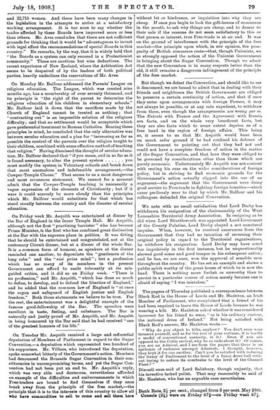On Tuesday Mr. Asquith received a large and influential deputation
of Members of Parliament in regard to the Sugar Convention,—a deputation which represented two hundred of his supporters. Mr. Villiers, who introduced the deputation, spoke somewhat bitterly of the Government's action. Members had denounced the Brussels Sugar Convention in their con- stituencies in uncompromising terms, and yet the Sugar Con- vention had not been put an end to. Mr. Asquith's reply, which was very able and dexterous, nevertheless afforded an example of the difficulties and embarrassments in which Free-traders are bound to find themselves if they once break away from the principle of the free markets—the principle that it is to the interests of this country to allow all who ken commodities to sell to come and sell them here without let or hindrance, or inquisition into why they are cheap. If once you begin to look the gift-horses of commerce in the mouth, to ask why things are cheap, and to demur to their sale if the reasons do not seem satisfactory to this or that person or interest, true Free-trade is at an end. It was on the ground of interference with the principle of the free market—the principle upon which, in our opinion, the pros- perity of British commerce rests—that, though Unionists, we so strongly opposed the action of the Unionist Government in bringing about the Sugar Convention. Though we admit that the new Convention is in many respects better than the old, it still remains a dangerous infringement of the principle of the free market.






































 Previous page
Previous page